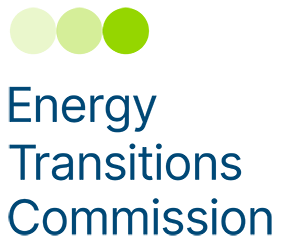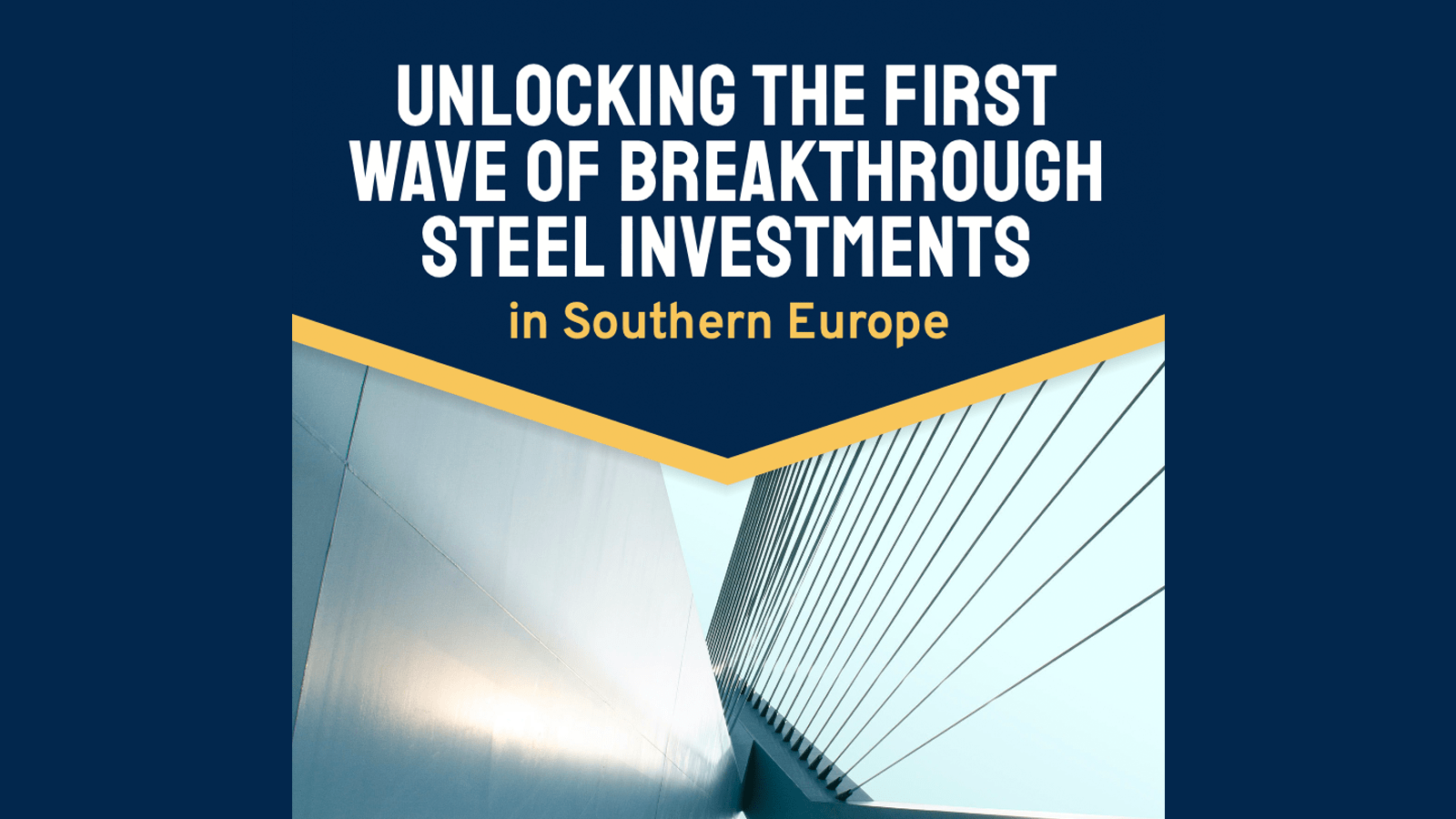Spain can capitalise on its abundant renewable energy resources to become an international frontrunner in breakthrough iron- and steelmaking
London, March 15th, 2023 – In a new report, “Unlocking the First Wave of Breakthrough Steel Investments in Southern Europe,” the Energy Transitions Commission (ETC) highlights the key economic benefits Spain, Portugal, and Italy could secure by pursuing a first wave of near-zero emissions primary (ore-based) steelmaking projects based on breakthrough iron and steel production technology using green hydrogen.
Using the case of Spain to demonstrate the opportunity in Southern Europe more widely, the report shows that favourable local conditions, particularly world-class renewable energy potential and land availability, create a robust basis upon which the gap to a viable investment case can be closed. Strategic and targeted action, namely the application of carbon pricing to steel imports via the EU carbon border adjustment mechanism (CBAM), combined with government funding or forward offtake agreements from buyers (involving an initial commensurate premium), would increase certainty for investors and financiers to make final investment decisions (FIDs) and take this vital step in the net-zero transition.
Putting the global steel industry on a 1.5oC-aligned pathway to net zero requires a rapid scale-up of near-zero emissions primary steelmaking. The necessary breakthrough iron and steelmaking technologies based on green hydrogen are available today and are already seeing interest in Southern Europe, with the latest announcement being Hydnum Steel’s proposed €1 billion green steel project in Puertollano. Southern European countries could accelerate investment in these technologies and join pioneers around the world in their deployment.
The emergence of breakthrough projects already in Spain shows that the right conditions for encouraging project proposals and enabling FIDs in Southern Europe are within reach. Crucial prerequisites include further scale-up of renewable electricity and hydrogen infrastructure, implementing effective carbon pricing on steel imports as well as domestic production, guarantees to manage technology risk, and government funding, such as support being made available through the Proyecto Estratégico para la Recuperación y Transformación Económica (PERTE) on industrial decarbonisation. All these actions are feasible in the short term and could collectively unlock a first wave of breakthrough steel investments in Spain and across Southern Europe more widely.
“Southern Europe’s economic prospects from the low-emissions steel transition are hugely promising. Blessed with abundant renewable energy resources it can both decarbonise its own industry and become a pioneering exporter of low-emissions primary steel to the rest of the EU and countries across the world. Seizing this opportunity will require collaboration from government, industry, finance and communities working together to strengthen the investment case for breakthrough technologies and turn favourable conditions into real-world economic advantage.” Adair Turner, Chair, ETC
“Spain’s excellent renewable resources offer a unique opportunity to attract a decarbonized steel industry based on green hydrogen. The collaboration of all the companies throughout the value chain and the support of the government are needed to launch this new industry of the future with a global reach.” Agustín Delgado – Chief Innovation and Sustainability Officer, Iberdrola
Breakthrough technology offers opportunities and benefits beyond decarbonisation for Southern Europe
International climate targets cannot be met without reducing emissions from steel, while the importance of steel to the energy transition and wider economy is expected to drive increased demand for the material. Breakthrough iron and steelmaking, where direct reduced iron (DRI) production technologies using green hydrogen are paired with electric arc furnaces (EAFs) for steelmaking, offers a solution for the decarbonisation of primary (ore-based) steel by replacing traditional emissions-intensive feedstocks, such as coal, with clean ones, namely green hydrogen and electricity, that can be produced via renewable sources.
Foundations are already being laid to transition Southern Europe’s only two primary steel mills in Gijón (Spain) and Taranto (Italy) to low-emissions production, but scaling up breakthrough technologies beyond these sites presents an opportunity to futher capitalise on Southern Europe’s world-class renewable energy resources. In doing so, the region could capture new markets for low-emissions and high-value iron and steel, grow regional industry, create high-value jobs, and future-proof the ferrous supply chains of its existing steelmakers who currently depend on imported scrap.
Key conditions for a viable investment case
A final investment decision (FID) represents a critical point in the steel investment process, signalling a firm financial commitment upon which contractors can proceed with procurement, construction, design, and engineering works. FID status, therefore, represents a vital step to realising a steel project in the real world.
Focusing on the Spanish context to underpin analysis, this report demonstrates that progressing breakthrough iron and steel projects in Southern Europe to FID is possible in the near term. Creating the conditions to enable this will rely on the following interventions by governments, industry, buyers, and financial institutions:
Investment in renewable electricity and green hydrogen – The cost of breakthrough iron and steel production is driven largely by clean energy feedstocks, namely renewable electricity and green hydrogen. In order to leverage Southern Europe’s renewable potential to meet the needs of breakthrough projects, government and industry will need to work together to ensure the smooth planning and build-out of clean energy generation and transportation.
Effective carbon pricing – Creating a level playing field between breakthrough iron and steel and their emissions-intensive counterparts is key to ensuring a competitive investment case for breakthrough technologies. Given that the majority (~65% in 2020) of Southern Europe’s steel exports went to neighbouring EU markets, effective implementation of the planned CBAM under the EU Emissions Trading System (EU ETS) will be vital to ensure both steel imports and domestic production face the same progressive carbon pricing in key target markets for Southern European breakthrough products.
Target funding for first-of-a-kind (FoaK) projects – Breakthrough projects in Southern Europe, particularly greenfield investments, will likely require a degree of direct government and EU-level support. Subsidies for their high upfront capital expenditures, potentially via the PERTE on industrial decarbonisation in the case of Spain, would allow governments to provide adequate support in a one-off mechanism. Subsidies for operational expenditures, similar to the tax credits for renewable hydrogen production available in the USA under the Inflation Reduction Act (IRA), would have an even greater effect on the breakthrough investment case but would likely involve a longer-term and more expensive commitment on the part of the government.
Guarantees for technology risk – Financial guarantees, typically backed by the government or public financial institutions, would help de-risk the uncertainty associated with novel breakthrough technologies and give financiers the confidence to commit to FIDs.
Premium forward offtake agreements – Forward purchase agreements from steel buyers, potentially involving an initial price premium commensurate with the higher costs of producing breakthrough products, would help firm up revenue streams for breakthrough projects and underpin their investment case.
Cross-value chain collaboration is needed, particularly government support
While a variety of actors will be needed to advance breakthrough steel projects in Southern Europe (including iron miners, energy suppliers, original equipment manufacturers, steelmakers, buyers, and financiers), the most important conditions for unlocking investment highlight the indispensable role of government in enabling FIDs. Action on energy infrastructure, carbon pricing, direct funding support, financial guarantees, and potentially also on offtake (via public procurement) would require a broader view of the benefits of an enhanced steel industry beyond just decarbonisation. It would require switching away from an approach of just focusing on decarbonising local emissions from steel to setting out a clear vision for the future of Southern Europe as a leader in the industrial cleantech landscape within European and global green steel markets.
“The ETC’s work with stakeholders from the full steel value chain in the Breakthrough Steel Investment Forum has been invaluable. The dialogue highlighted the importance of local iron ore and abundant renewables for building sustainable and resilient supply chains that minimize emissions. The ETC’s work transforming these and other complex factors into actionable insights and useful tools is a crucial step toward the future of steel.” Aba Schubert – Board Member, Aethel Mining
This report is underpinned by a financial model, developed by the ETC, that simulates the financial performance of different breakthrough steel project configurations in Spain. The financial model has been made open-access for public use. To read the insight report and access the model visit: https://www.energy-transitions.org/publications/breakthrough-steel/
“Unlocking the First Wave of Breakthrough Steel Investments in Southern Europe” was developed as part of a series of roundtables in Spain, convened by the ETC between October – December 2022 with the support of Breakthrough Energy. The roundtables were open to Portugal, Spain and Italy steel value chain stakeholders, including policymakers and financiers, and saw participation from organisations including ACCIONA, Aethel Mining, Alfa Acciai, ArcelorMittal, BBVA, Cargill Metals, Climate Strategy & Partners, Danieli, EDP, EIT InnoEnergy, Enagas, European Bank for Reconstruction and Development, GravitHy, H2 Green Steel, HyDeal, Iberdrola, ING, Instituto para la Diversificación y Ahorro, de la Energía (IDAE), Ministerio para la Transición Ecológica y el Reto Demográfico (MITECO), Santander, SMS Group, Tenova, UNESID, UniCredit, and Vale.
ENDS
Note to editors:
- The Southern Europe Breakthrough Steel Investment Forum forms part of a larger regional forum series, comprising additional fora convened by the ETC with the support of Breakthrough Energy in United Kingdom, Western Europe, and the United States of America (the latter also with the collaboration of RMI).
- “Unlocking the First Wave of Breakthrough Steel Investments in the Southern Europe” was informed by discussions with participants of the Southern Europe Breakthrough Steel Investment Forum, but the organisations represented by those participants have not been asked to formally endorse the report, which should not be treated as reflecting the views of those organisations.
- The financial analysis contained in “Unlocking the First Wave of Breakthrough Steel Investments in Southern Europe” focuses on Spain as an illustrative case, the results of which are then used to highlight implications for the rest of Southern Europe.
- Breakthrough iron and steel projects that have already been proposed in Southern Europe include:
- ArcelorMittal Gijon (Spain)
- H2 Green Steel (Iberia)
- Hydnum Steel Puertollano (Spain)
- All analysis contained in “Unlocking the First Wave of Breakthrough Steel Investments in Southern Europe” was undertaken by the ETC. For more information on the ETC please visit: https://www.energy-transitions.org/
Media contacts:
Caroline Randle, Energy Transitions Commission – [email protected]
Vicki Harding, Energy Transitions Commission – [email protected]


